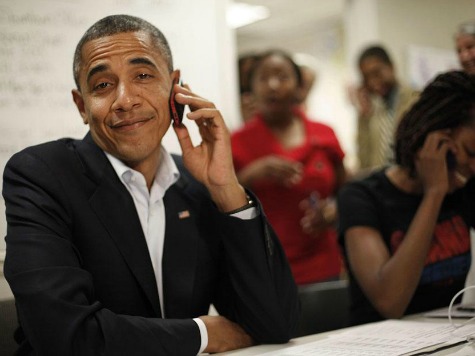On Sunday’s edition of This Week, ABC News aired an interview conducted with President Barack Obama on Friday. Among other familiar Obama tropes–such as the threat not to negotiate with congressional leaders over the debt ceiling, which is odd considering he’s perfectly willing to negotiate with Vladimir Putin–was the claim that slow job growth during his administration has been caused by technological advancement.
It is a claim that Obama has made repeatedly throughout his presidency. In 2011, he cited the same reasons for high unemployment in an interview with NBC News’ Ann Curry: “If you see it when you go to a bank you use the ATM, you don’t go to a bank teller. Or you go to the airport and you use a kiosk instead of checking in at the gate,” he said. He apparently believes there is a trade-off between innovation and employment.
That is an odd conviction for a president who purports to believe in the importance of innovation to the U.S. economy. The White House even has a “Strategy for American Innovation” that aims “to ensure economic growth that is rapid, broad-based, and sustained.” In his recent economic speech at Knox College, Obama pledged to push for innovation in manufacturing and education, going around Congress if necessary.
Yet by the president’s own faulty logic, these initiatives would cost American jobs (just ask those tellers and travel agents). Indeed, his push for alternative energy technologies, such wind and solar power and electric cars, would destroy thousands of fossil fuel jobs. (He is also aiming to do that, independently, through regulation that makes new coal plants cost-prohibitive and new oil leases impossible on public land.)
New technology does have a short-term effect on jobs in certain industries. But a growing economy creates new industries, as well. Over time, technology creates many more jobs, as well as greater welfare, which is the point of economic activity to begin with. On one level, the president–or his advisers–know this. But his big-government outlook on the world and his desire to avoid blame prevent him from admitting it.
Some of the interests most directly threatened by new technology–and by competition in general–also have the loudest voices in Washington, and have been Obama’s sponsors throughout his political life. Big unions have always warped Obama’s thinking on economic issues, a fact evident from his second autobiography, The Audacity of Hope, in which he admits the logic of free trade but cannot bring himself to support it.
He opposed the Central American Free Trade Agreement, he says, out of protest “against what I considered to be the [Bush] White House’s inattention to the losers from free trade” (209). That reveals a key aspect of Obama’s political character: a keen sense of the potential of opposition politics, but no ability to grasp the interest of American society as a whole, no vision beyond a narrow, radical, utopian ideological sentiment.
That is why Obama excels at campaigning but fails at governing. The president who owes his own election to the most advanced technology ever deployed in a campaign, and who relies on support from members of a technologically-savvy generation, blames that same technology for his economic failures. It is not new invention, but old statism, that hampers Obama–but that is something he will not or cannot, understand.

COMMENTS
Please let us know if you're having issues with commenting.